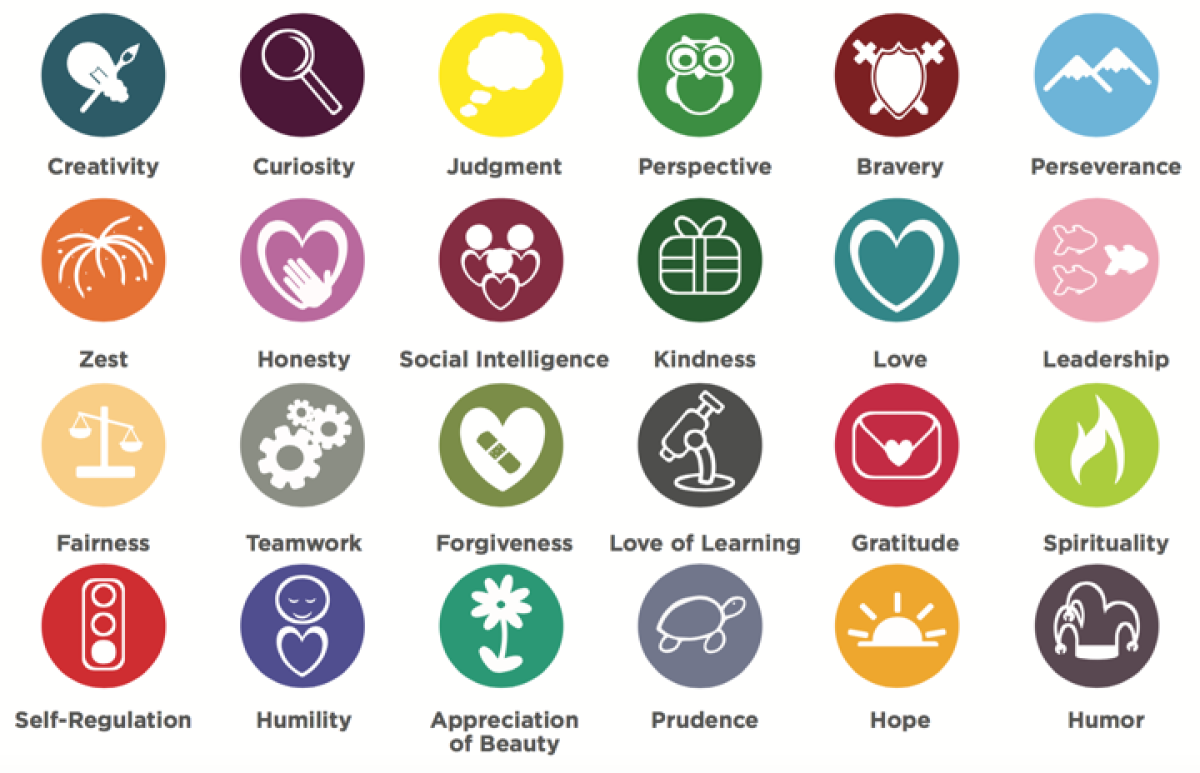Why Character Strengths?
3 June 2018
Written by Head of Well-being, Kerry Larby
I have always been intrigued by the nuances of character. Each individual has a unique constellation of strengths that interact to make them who they are. One of the great joys of being an educator is interacting with a wide diversity of students (and staff). No two are ever the same; and nor would we want them to be.
What are character strengths?
Character strengths are the virtuous traits that reflect our personal identity and behaviour. In this sense, they are about ‘being’ and ‘doing’. Our character strengths produce positive outcomes for ourselves and others and contribute to the collective good. Professor Martin Seligman has emphasised that strengths are the pathway that lead to human flourishing and well-being. (You can read about St Andrew’s framework for well-being here).

A focus on human strengths is nothing new (far from it). Through history, philosophers have pondered human virtues and attempted to evaluate which are most important: Aristotle championed practical wisdom to be the master virtue; Confucius valued benevolence; Cicero celebrated gratitude to be the parent of all virtues and Saint Thomas Aquinas prioritised the Christian values of faith, hope and charity.
St Andrew’s College was founded on Christian values. Our chapel services are dedicated to virtues which develop positive relationships; Faith, Hope, Compassion, Respect, Honesty, Generosity and Responsibility.

The VIA Classification for Character Strengths
In 2005, Professor Chris Peterson and Professor Martin Seligman embarked on an ambitious (and hugely fascinating) three-year project. During this time, they collaborated with over 55 leading academics on the topic of character in philosophy, virtue ethics, moral education, psychology and theology. Their research spanned religious texts and manuscripts, literature and poetry over the past 2500+ years. The goal was to classify the virtues and strengths found universally in human beings across religions, cultures, nations, and belief systems. No mean feat.
The result was the creation of the Values in Action (VIA) Classification of Strengths and Virtues. This framework provides a common language that describes what is best about human beings. It comprises of six virtues (wisdom, courage, humanity, justice, temperance, and transcendence), and 24-character strengths or values that provide the pathway to the virtues.
In the past decade, the VIA classification of character has been used and researched extensively, both in organisations and educational contexts.

Why should we use character strengths?
Using character strengths is about much more than just completing a survey. Character strengths provide the basis for a philosophical shift.
Positive Education is about creating a strengths-based focus (not an easy thing to do). Our brains tend to have a negativity bias, focusing and reacting to what is not right or what is missing. Character strengths provide us with a vocabulary to celebrate what is right, or what works. Research indicates that an individual or organisation will be more energised to change if it builds and focuses on its strengths.
Developing an understanding of one’s character strengths and utilising them in a variety of ways builds confidence and competence.
Using our signature strengths, those strengths that are most central to who we are, is one of the most researched and practiced concepts in positive psychology. The main criterion for determining a signature strength is that it is viewed as being core or essential to who you are; when people focus on their signature strengths, they are energised, have a sense of authenticity and are internally motivated. An awareness of our signature strengths is important for engagement at school and work.
Having an understanding that all character strengths matter is important for building positive relationships. When people recognise and appreciate signature strengths in others they build stronger relationships. This is hugely important when working in diverse teams; organisations flourish when individuals can spot and appreciate strengths in others.
Exploring and applying character strengths develops our self-awareness. Self-awareness is important for effective learning, teaching, leadership and for overall well-being and resilience. Each character strength can be overused, underused or misused. It is important that we understand the ‘shadow side’ of our strengths.
Aligning our strengths and goals has been proven to result in greater accomplishment. When goals are self-concordant with who we authentically are, we are more intrinsically motivated.

Character is shaped through our genetics, relationships and experiences. Although our character strengths are relatively stable, research shows that we can intentionally nurture habits of virtue and build upon our strengths. Character traits are malleable and intentional changes can have a positive impact.
An understanding of character strengths broadens educational outcomes. Yay. When we focus on character strengths we praise the process and understand there are many pathways that lead to human flourishing and goal attainment. Old collegians all over the world have harnessed their strengths in a multitude of ways; creativity, teamwork, perseverance, kindness, bravery, leadership. The list goes on.

This blog post discusses how our student leaders at St Andrew’s College are currently celebrating character through student agency.
This year, St Andrew’s College leadership and staff are participating in professional development using the Aware-Explore-Apply Model created by the world’s leading academic on VIA character strengths, Professor Ryan Niemiec. We believe it is important to develop an understanding of character strengths in our teams.
Character strengths will begin to be integrated explicitly and implicitly into our curriculum in 2019. Our Head of Health, Nicola Richards is doing great work in integrating character into our health curriculum. Tom Matthews, our Head of Guidance, also plans to host some parent seminars focusing on Strength Based Parenting.
My top character strengths are love of learning, appreciation of beauty and excellence and social intelligence. An understanding of my strengths has built my self awareness, resilience and improved my decision making.
Do you know your own strengths? What are the character strengths that you find most energising and natural to use?
Related Posts


